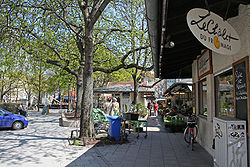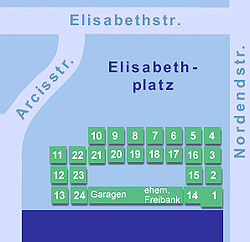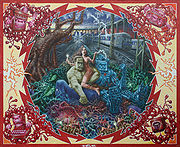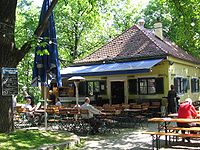
Elisabethmarkt
Encyclopedia

Schwabing
Schwabing is a borough in the northern part of Munich, the capital of the German state of Bavaria. It is divided into the city borough 4 and the city borough 12...
, a district of Munich
Munich
Munich The city's motto is "" . Before 2006, it was "Weltstadt mit Herz" . Its native name, , is derived from the Old High German Munichen, meaning "by the monks' place". The city's name derives from the monks of the Benedictine order who founded the city; hence the monk depicted on the city's coat...
, Germany
Germany
Germany , officially the Federal Republic of Germany , is a federal parliamentary republic in Europe. The country consists of 16 states while the capital and largest city is Berlin. Germany covers an area of 357,021 km2 and has a largely temperate seasonal climate...
.
Deep in the heart of Schwabing, the inhabitants (and of course all the visitors) have been able to supply themselves with fresh groceries for more than 100 years. This market, which was named after the Austrian Empress Sisi, offers the entire range from meat and poultry, fruit and vegetables to delicatessen and snacks.
History
Elisabethplatz and Elisabethstrasse were named in 1898 after the Empress Elisabeth of BavariaElisabeth of Bavaria
Elisabeth of Austria was the spouse of Franz Joseph I, and therefore both Empress of Austria and Queen of Hungary. She also held the titles of Queen of Bohemia and Croatia, among others...
of Austria, better known as Sisi. She was the daughter of Duke
Duke
A duke or duchess is a member of the nobility, historically of highest rank below the monarch, and historically controlling a duchy...
Max of Bavaria and the cousin of King Ludwig II of Bavaria
Ludwig II of Bavaria
Ludwig II was King of Bavaria from 1864 until shortly before his death. He is sometimes called the Swan King and der Märchenkönig, the Fairy tale King...
In 1854 she married Emperor
Emperor
An emperor is a monarch, usually the sovereign ruler of an empire or another type of imperial realm. Empress, the female equivalent, may indicate an emperor's wife or a woman who rules in her own right...
Franz Joseph I, after whom the Franz-Joseph-Straße had already been named in 1894. The couple occasionally spent time with their relatives in Schwabing.


The market hall on Elisabethplatz which was already built in 1903, was destroyed by bombs in World War II, which also severely damaged the entire market. Business, however, was maintained as far as possible by the improvisational skills of the vendors and the city council. After World War II the market was restored and the market hall was replaced by pavilions which are still the main trait of this market today.

Beer garden
Beer garden is an open-air area where beer, other drinks and local food are served. The concept originates from and is most common in Southern Germany...
is located here.
Administration
The Elisabethmarkt ist organized by the Wholesale Market MunichWholesale Market Munich
The Großmarkthalle München is an international wholesale market located in the Munich borough of Sendling. In an area of 310,000 m², 270 importing companies and wholesalers offer 140 different product classes from 83 countries with a sales volume of more than 750 million Euro...
. The Wholesale Market Munich, together with Elisabethmarkt, Viktualienmarkt
Viktualienmarkt
The Viktualienmarkt is a daily food market and a square in the center of Munich, Germany.The Viktualienmarkt developed from an original farmers' market to a popular market for gourmets...
, Pasing Viktualienmarkt
Pasing Viktualienmarkt
The Pasing Viktualienmarkt is a daily food market in Pasing, a district of Munich.Situated next to the Pasing town hall, in a beautiful courtyard, the Pasing Viktualienmarkt offers everything you could wish for: bread and cheese, fish and meat, flowers and herbs...
, Wiener Markt
Wiener Markt
The Wiener Markt is a daily food market in Haidhausen, a district of Munich.The market at Wiener Platz forms the centre of the district of Haidhausen. Here you can stock up on all the foods for your everyday needs...
and the Weekly Markets in Munich
Weekly Markets in Munich
The weekly markets in Munich, Germany, are an important source of food to the residents of the city. The population of the city is provided with groceries by 41 weekly markets, including farmers’ markets and organic-food markets on a daily basis...
, is a municipal company run by the City of Munich.

